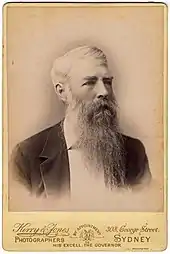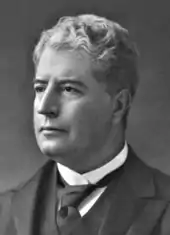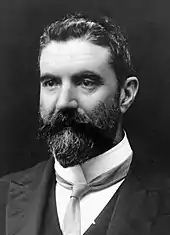Philip Fysh
Sir Philip Oakley Fysh KCMG (1 March 1835 – 20 December 1919) was an Australian politician. He arrived in Tasmania in 1859 and became a leading merchant in Hobart. He served two terms as premier of Tasmania (1877–1878, 1887–1892) and became a leader of the colony's federation movement. He subsequently won election to the new federal House of Representatives (1901–1910) and was invited to represent Tasmania in the first federal ministry, serving as minister without portfolio (1901–1903) and Postmaster-General (1903–1904).
Sir Philip Fysh KCMG | |
|---|---|
.jpg.webp) | |
| Postmaster-General of Australia | |
| In office 10 August 1903 – 27 April 1904 | |
| Prime Minister | Edmund Barton Alfred Deakin |
| Preceded by | James Drake |
| Succeeded by | Hugh Mahon |
| Premier of Tasmania | |
| In office 29 March 1887 – 17 August 1892 | |
| Governor | Robert Hamilton |
| Preceded by | James Agnew |
| Succeeded by | Henry Dobson |
| In office 9 August 1877 – 5 March 1878 | |
| Governor | Frederick Weld |
| Preceded by | Thomas Reibey |
| Succeeded by | William Giblin |
| Personal details | |
| Born | Philip Oakley Fysh 1 March 1835 Highbury, London, England |
| Died | 20 December 1919 (aged 84) Sandy Bay, Tasmania, Australia |
| Political party | Protectionist (to 1909) Fusion (from 1909) |
| Spouse(s) | Esther Willis (m. 1856–1912) |
| Relations | William Willis (brother-in-law) |
| Occupation | Merchant |
Early life
Fysh was born in Highbury, London, the son of John Fysh and his wife Charlotte. He was educated at the Denmark Hill school in Islington. At 13 years of age, Fysh commenced work in a London stockbroker's office, then he obtained a position in the office of a shipping firm, L. Stevenson & Sons, with Australian connections. Fysh migrated to Tasmania in 1859, becoming a leading merchant (establishing P. O. Fysh and Company), hop-grower and orchardist.
Colonial politics
A Protectionist, Fysh was a member of the Tasmanian Legislative Council from 1866–69, 1870–73, 1884–90, and of the Tasmanian House of Assembly 1873–78 (where he was treasurer in the Alfred Kennerley ministry until March 1875) and 1894–99. Fysh became Premier and Chief Secretary of Tasmania in 1877, serving initially until 1878 and returning to the positions in 1887, serving to 1892. He was again elected to the assembly and was treasurer in Braddon's ministry from April 1894 to December 1898, when he was appointed Agent-General for Tasmania at London.
Federation movement

Fysh took an important part in the federal movement in Tasmania. He was a representative of his colony at the 1891 and 1897 conventions, and was a member of the Australian delegation that watched the passing of the federal bill through the Imperial Parliament.
Federal politics
Fysh was elected to the Australian House of Representatives in 1901 as a member for Division of Tasmania and was minister without portfolio until 1903. After Tasmania was split into five electoral divisions in 1903, Fysh was elected for the Division of Denison, based on Hobart. He was Postmaster-General 1903–04. He retired in 1910.
Later life

Fysh was created a Knight Commander of the Order of St Michael and St George (KCMG) in January 1896. He died in December 1919, aged 84. He was survived by five sons and four daughters. Fysh's wife, Esther Kentish Willis, was the daughter of William, a straw-hat manufacturer of Luton, Bedfordshire, who was also father of the judge and M.P. William Willis.[1]
See also
References
- Dod's Peerage, Baronetage and Knightage, 1901, S. Low, Marston & Co., p. 376
- Parliamentary Library profile
- Serle, Percival (1949). "Fysh, Philip". Dictionary of Australian Biography. Sydney: Angus and Robertson. Retrieved 29 October 2008.
- Quentin Beresford, 'Fysh, Sir Philip Oakley (1835–1919)', Australian Dictionary of Biography, Volume 8, MUP, 1981, pp 602–603.
| Political offices | ||
|---|---|---|
| Preceded by Thomas Reibey |
Premier of Tasmania 1877–1878 |
Succeeded by William Giblin |
| Preceded by James Agnew |
Premier of Tasmania 1887–1892 |
Succeeded by Henry Dobson |
| Preceded by James Drake |
Postmaster-General 1903–1904 |
Succeeded by Hugh Mahon |
| Tasmanian Legislative Council | ||
| Preceded by John Wedge |
Member for Hobart 1866–1869 Served alongside: Kennerley, Wilson |
Succeeded by William Crowther |
| Preceded by Thomas Lowes |
Member for Buckingham 1870–1873 |
Succeeded by Thomas Chapman |
| Preceded by Thomas Chapman |
Member for Buckingham 1884–1894 |
Succeeded by Frederick Piesse |
| Parliament of Australia | ||
| New division | Member for Tasmania 1901–1902 Served alongside: Braddon, Cameron, O'Malley, Piesse |
Division abolished |
| Member for Tasmania 1902–1903 Served alongside: Braddon, Cameron, Hartnoll, O'Malley | ||
| New division | Member for Denison 1903–1910 |
Succeeded by William Laird Smith |

